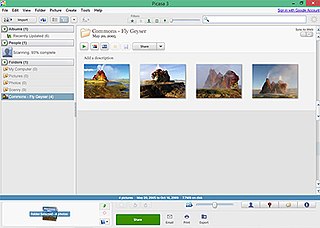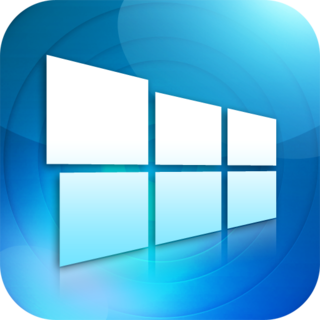
AutoCAD is a 2D and 3D computer-aided design (CAD) software application developed by Autodesk. It was first released in December 1982 for the CP/M and IBM PC platforms as a desktop app running on microcomputers with internal graphics controllers. Initially a DOS application, subsequent versions were later released for other platforms including Classic Mac OS (1989), Microsoft Windows (1993) and macOS (2010), along with companion web and mobile applications.

Adobe Flash is, except in China, a discontinued multimedia software platform used for production of animations, rich internet applications, desktop applications, mobile apps, mobile games, and embedded web browser video players.

Adobe Photoshop is a raster graphics editor developed and published by Adobe Inc. for Windows and macOS. It was originally created in 1987 by Thomas and John Knoll. Since then, the software has become the most used tool for professional digital art, especially in raster graphics editing. The software's name is often colloquially used as a verb although Adobe discourages such use.

Safari is a web browser developed by Apple. It is built into Apple's operating systems, including macOS, iOS, iPadOS and their upcoming VisionOS, and uses Apple's open-source browser engine WebKit, which was derived from KHTML.

Picasa was a cross-platform image organizer and image viewer for organizing and editing digital photos, integrated with a now defunct photo-sharing website, originally created by a company named Lifescape in 2002. "Picasa" is a blend of the name of Spanish painter Pablo Picasso, the word casa and "pic" for pictures.
This is a comparison of both historical and current web browsers based on developer, engine, platform(s), releases, license, and cost.

Dashboard is a discontinued feature of Apple Inc.'s macOS operating systems, used as a secondary desktop for hosting mini-applications known as widgets. These are intended to be simple applications that do not take time to launch. Dashboard applications supplied with macOS included a stock ticker, weather report, calculator, and notepad; while users could create or download their own.

Colloquy is an open-source IRC, SILC, ICB and XMPP client for Mac OS X. Colloquy uses its own core, known as Chat Core, although in the past it used Irssi as its IRC protocol engine. One of the primary goals behind Colloquy was to create an IRC, SILC and ICB client with Mac OS X visuals. Colloquy contains a user interface that follows Apple's Human interface guidelines in addition to containing support for traditional IRC command-line controls such as /nick and /join.
Mozilla Firefox has features that allow it to be distinguished from other web browsers, such as Chrome and Internet Explorer.

Bing Maps is a web mapping service provided as a part of Microsoft's Bing suite of search engines and powered by the Bing Maps Platform framework which also support Bing Maps for Enterprise APIs and Azure Maps APIs. Since 2020, the map data is provided by TomTom, OpenStreetMap and others.

Zotero is free and open-source reference management software to manage bibliographic data and related research materials, such as PDF files. Features include web browser integration, online syncing, generation of in-text citations, footnotes, and bibliographies, an integrated PDF reader and note editor, as well as integration with the word processors Microsoft Word, LibreOffice Writer, and Google Docs. It was originally created at the Center for History and New Media at George Mason University and, as of 2021, is developed by the non-profit Corporation for Digital Scholarship.

Parallels Desktop for Mac is software providing hardware virtualization for Macintosh computers with Intel processors, and since version 16.5 also for Apple silicon-based Macintosh computers. It is developed by Parallels, since 2018 a subsidiary of Corel.

Cooliris, Inc. was a US corporation headquartered in San Francisco, California, that developed photo viewing products on mobile, web, and desktop platforms. It was a venture backed by Kleiner, Perkins, Caufield & Byers, T-Venture, DAG Ventures, The Westly Group and NTT DOCOMO.

Boxee was a cross-platform freeware HTPC software application with a 10-foot user interface and social networking features designed for the living-room TV. It enabled its users to view, rate and recommend content to their friends through many social network services and interactive media related features.

Google Chrome is a cross-platform web browser developed by Google. It was first released in 2008 for Microsoft Windows, built with free software components from Apple WebKit and Mozilla Firefox. Versions were later released for Linux, macOS, iOS, and also for Android, where it is the default browser. The browser is also the main component of ChromeOS, where it serves as the platform for web applications.
Google Quick Search Box (GQSB) is an application launcher and desktop search tool developed by Google for Mac OS X computers. It allows users to search files, URLs, and contacts on their computer, as well as performing actions on the results.
QVD is an open-source virtual desktop infrastructure (VDI) product built on Linux. Its main purpose is to provide remote desktops to users.
Metaio GmbH was a privately held augmented reality (AR) company that was acquired by Apple Inc. in May of 2015. Headquartered in Munich, Germany, with subsidiaries in San Francisco, California, New York City, New York and Dallas, Texas, Metaio provided a software development kit (SDK) for programming PC, web, mobile application and custom offline augmented reality applications. Additionally, Metaio was the creator of Junaio, a free mobile AR browser available for Android and iOS devices.

Sketchfab is a 3D modeling platform website to publish, share, discover, buy and sell 3D, VR and AR content. It provides a viewer based on the WebGL and WebXR technologies that allows users to display 3D models on the web, to be viewed on any mobile browser, desktop browser or Virtual Reality headset.

Mercury Browser is a discontinued freeware mobile browser for Android, developed by iLegendSoft. Mercury Browser uses the Webkit engine. It was formerly available for iOS, but in 2017, it was removed from the App Store.









